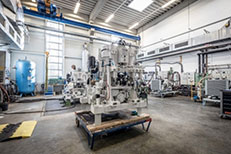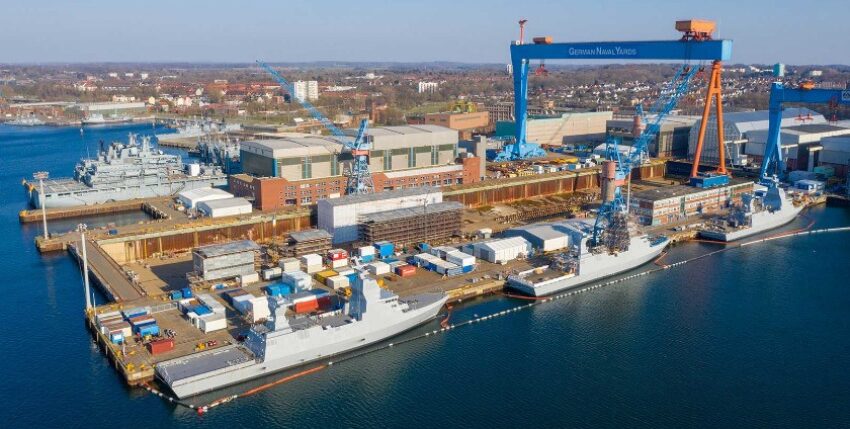Dieter Hanel traced the development of the Bundeswehr and navy in Kiel in marineforum 7/8-2022. In the second part, the author takes a look at the maritime industry in the state capital.
The rearmament of Germany and the formation of the Bundeswehr in 1955 also marked the beginning of the reconstruction of the German defence industry. On 16 March 1959, Kiel-based Howaldtswerke, which still had around 13,000 employees at the time, received an order from the Federal Office of Defence Technology and Procurement for the construction of twelve Class 201 submarines, based on the development results of the Lübeck engineering office. Construction of the first U 1 submarine began on 12 December 1959 and it entered service on 20 March 1962. The component suppliers, including well-known names such as An-schütz, Elac and Hagenuk, were also able to quickly translate their shipbuilding expertise into high-performance products for naval shipbuilding.
The euphoric hopes for an era of world peace and the high expectations of a substantial "peace dividend" as well as the associated cuts in defence spending shaped Germany's security policy and the orientation of the Bundeswehr shortly after the end of the Cold War. Without a comprehensive security policy analysis and a long-term strategy, this led to a large number of Bundeswehr reforms that were never completed.
After the end of the Cold War, the economic situation for companies in the naval shipbuilding industry became extremely difficult within a short period of time. The companies based in Kiel at the time had to cope with a considerable reduction in personnel and a decline in sales up to 1994, combined with far-reaching restructuring. The number of people directly employed in defence technology in Kiel fell from 1825 to 1445 between 1992 and 1994. This was the lowest level that Kiel had ever recorded in naval shipbuilding.
At the end of the Cold War, the defence industry was faced with difficult fundamental strategic decisions about its future direction. There was no shortage of recommendations. Björn Engholm, the Social Democratic Prime Minister of the state at the time, assessed the situation as early as 1989 as follows: "It cannot be denied that warship construction is still of considerable importance for the remainder of our shipbuilding industry. However, our political goal is just as clear: to reduce this significance."
In 1994, Schleswig-Holstein's Economics Minister Peer Steinbrück expressed the following opinion: "The switch to civilian products is a promising strategy for utilising the existing potential of the defence industry in a future-oriented manner, reducing its susceptibility to crises and securing highly qualified jobs in these companies. (...) Some companies in Schleswig-Holstein have quickly recognised the need for reorientation and have rapidly driven forward the development and marketing of civilian products in recent years, which has often significantly improved their future prospects. The state government believes it is right that as many companies as possible in Schleswig-Holstein should follow this path." Steinbrück was thoroughly mistaken here, as the further development of the security policy situation and companies to date has shown.
However, most companies did not agree with these political, often ideological assessments of the situation in the defence technology industry and the resulting recommendations for strategic orientation. They saw restructuring and consolidation, forward-looking technologies and new, operational military products as well as a focus on accessible foreign markets as opportunities for a successful orientation in the defence technology core business despite the dramatic reduction in personnel and decline in sales. So it was like a hopeful signal for the future positive development of the defence technology industry in Schleswig-Holstein when the new navy frigate was christened SCHLESWIG-HOLSTEIN at HDW in Kiel in 1994.

With 13 companies and 4516 employees directly involved in defence technology, Kiel has an efficient naval shipbuilding industry. With its key technologies, this is an important component of the German defence base. Naval shipbuilding is therefore of particularly high economic and industrial policy significance for Kiel, which has grown significantly in recent years. While industrial jobs in the state capital have almost halved from 22,000 to 12,000 since 1990, the companies active in naval shipbuilding have seen a 150 per cent increase from 1,825 to 4,550 employees.
Schleswig-Holstein is not a classic industrial state. The state government is therefore pursuing the goal of "modernising Schleswig-Holstein's image and helping to position it as an industrial location". In a joint position paper in February 2020, the state government, business associations, trade unions, chambers and local authorities also acknowledged that the northernmost federal state has an economically and technologically significant defence and security industry: "Defence technology expertise characterises Schleswig-Holstein as an industrial location." And with just under half of the companies and 70 per cent of defence technology employees, this includes Kiel in particular.
Foreign market
Since reunification, investments in the German defence budget have never been sufficient to continuously utilise the minimum capacities and maintain the technologies at the defence companies, meaning that the foreign market is of existential importance. As a result, foreign markets have become increasingly important for Kiel's defence technology industry, partly due to changes in the global security situation and partly due to the need for increased international armaments cooperation.
Of the 68 relevant incoming orders that the naval shipbuilding companies in Kiel received from a total of 25 countries between 1993 and 2020, 52 came from abroad, including 22 NATO, EU and equivalent countries. The main focus of the so-called third countries was on Asia, the Middle East and North Africa. These orders have in no way "jeopardised global peace efforts", but have contributed to regional security and stability.

Over the last 25 years, the marine industry in Kiel has developed extremely positively in terms of employment and turnover. However, the annual defence technology turnover, which is between one and almost two billion euros, fluctuates greatly, particularly for accounting reasons. Exports account for around 50 to 70 per cent of sales and have grown far more strongly than domestic sales since the fall of communism. Naval shipbuilding in Kiel has seen a permanent increase in the number of employees from 2180 in 1995 to 4486 (+106 %) in 2020.
At the former HDW shipyard site in Kiel, the major changes and the strategic reorientation and economic development of shipbuilding are particularly evident. Whereas in 1992 only 600 of the company's 4000 employees worked in defence technology, there are now 3463 employees in naval shipbuilding, 3081 at Thyssenkrupp Marine Systems in Kiel and 382 at German Naval Yards Kiel, and none in civilian shipbuilding. These figures illustrate the change and the extraordinary importance of naval shipbuilding for the city.
Diverse companies
The Kiel-based shipbuilding company Thyssenkrupp Marine Systems is a leading global systems house for the design and construction of submarines and naval surface vessels as well as maritime security technologies. Other areas of expertise include the repair and modernisation of submarines and surface vessels as well as the development and integration of components.
The company, which belongs to the Essen-based Thyssenkrupp Group, is the number three in German defence technology with around 6300 employees at its sites in Kiel, Hamburg and Emden. Since 1960, Thyssenkrupp Marine Systems has concluded contracts with 20 countries for the construction of 169 submarines. Of these, 112 were manufactured in Germany and a further 57 from prefabricated material packages in the respective customer country. This makes it the global market leader in the field of conventional submarines. It also develops and designs state-of-the-art frigates, corvettes and naval support vessels.
While the proportion of employees in merchant shipbuilding was still 85 per cent in 1992, this has fallen continuously over the years. In contrast, the company has seen a sharp increase in the number of employees in the defence technology sector. At the same time, sales of military technology have risen sharply.

often come from J.P. Sauer & Sohn, Photo: Sauer
German Naval Yards Kiel is a shipyard specialising in the design and construction of large, highly integrated naval vessels such as frigates, corvettes and offshore patrol vessels (OPVs) and is part of the Privinvest Group based in Lebanon. The takeover of the HDW Gaarden GmbH surface shipbuilding yard from Thyssenkrupp in 2011 created a new, efficient shipyard group.
Elac Sonar is a long-established Kiel-based company specialising in hydroacoustic systems. The product portfolio includes innovative sonar systems, echo sounders and multibeam systems as well as underwater communication systems for military and civilian applications. Elac has 138 employees in defence technology.
Hagenuk Marinekommunikation, whose company history dates back to 1899, is a system provider of military communication technology for surface vessels and submarines with 208 defence technology employees. In Europe, the company is the market leader for integrated submarine communication systems and one of the world's leading manufacturers of integrated radio telecommunication systems.
With 50 defence technology employees at the Kiel site, Hensoldt is responsible for the installation, integration and commissioning of electronic equipment, systems and devices in the fields of radar, reconnaissance and communications as well as for system support, particularly for the Bundeswehr, but also for foreign armed forces.
Founded in 1905 as Anschütz in Kiel, the traditional company Raytheon Anschütz is now part of the global Raytheon Technologies group. It employs 555 people at its headquarters in Kiel, 185 of whom work in defence technology, and is one of the world's leading manufacturers of integrated navigation and bridge systems as well as nautical equipment. Its customers include more than 60 navies and authorities.

In 2019, the global technology group Rohde & Schwarz established a facility in Kiel with the aim of focussing its development activities at this location on the national and international marine business. Rohde & Schwarz employs 55 people.
J.P. Sauer & Sohn Maschinenbau, based in Kiel, is the headquarters of the medium-sized Sauer Compressors group of companies with twelve international subsidiaries. With 90 defence technology employees, the company develops, produces and sells medium and high-pressure compressors for applications in the marine, shipping, industrial and petroleum industries.
Thales Deutschland GmbH, which belongs to the French Thales Group, designs and implements communication and navigation systems for surface vessels for the German Navy and international customers at its Naval Competence Centre in Kiel with 260 employees.
In addition to the system and component manufacturers, numerous other suppliers and service providers are active in naval shipbuilding in Schleswig-Holstein. These include Ferchau, Heitec, Meos and Scope-Engineering.
Perspectives
The Kiel-based Bundeswehr and the naval industry have undergone a profound transformation since the end of the Cold War, caused on the one hand by massive troop reductions as a result of the drastic underfunding of the Bundeswehr and on the other by the focus on international crisis management.
Following the extensive reductions in personnel and material, alliance and national defence as well as the changed security situation in the Baltic Sea region now also require the Bundeswehr stationed in Kiel to build up additional military capacities and new capabilities. The equipment required for this must now be procured in a timely manner in a far-sighted, cooperative partnership between politics, the Bundeswehr and industry.

Kiel's companies must continue to successfully orientate themselves strategically, demonstrate their flexibility and efficiency and maintain their competitive market position with new, high-performance products at home and abroad. The city of Kiel, which has always had a critical relationship with the military, should recognise that it is not only a sailing city, but that the Bundeswehr and the defence industry make an indispensable contribution to peace and freedom in our country and at the same time represent significant parts of the city's economy.
Dieter Hanel is Chairman of the Defence Technology Working Group of the Schleswig-Holstein Business Association and author of the book "Bundeswehr und Verteidigungsindustrie. Security and Technology in Schleswig-Holstein"
Dieter Hanel







